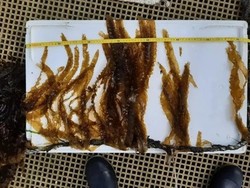
Scientists farm kelp in UK’s inshore waters to test its environmental benefits
Editor/Mohamed Shihab
A team of scientists working on restoring areas of the Solent – an inshore stretch of water between the UK’s south coast and the Isle of Wight – have begun growing seaweed to test its use to improve marine habitats and water quality.
The researchers from the University of Portsmouth want to see if sugar kelp (Saccharina latissima) can be successfully farmed inshore, while also improving water quality. The seaweed species is generally grown offshore as it’s easier for suppliers to find space, but the team hopes their study – using a the test site at Langstone Harbour – will provide evidence of the environmental benefits, with the seaweed removing excess nutrients from the water.
The study is part of the Rapid Reduction of Nutrients in Transitional Waters (RaNTrans) project, which is exploring how nature-based approaches can improve and protect marine ecosystems.
Professor Gordon Watson from the University of Portsmouth and RaNTrans project leader, said in a press release: “The overall purpose of culturing the seaweed is to demonstrate how restorative aquaculture can not only be useful commercially, but also has an important role to play in improving our waters. So if this works, businesses could farm the kelp and sell the product while simultaneously improving water quality.”
The project team comprises nine partners from across the UK and France testing a variety of methods to improve water quality from culturing oysters to mechanically removing the green algal mat.
The Solent team will now examine whether the kelp absorbs nutrients and as it grows in dense groupings – much like a forest on land – could even provide food and shelter for many species. As part of the analysis, the team will also look at how much carbon kelp could store, as they believe much of the Solent’s potential to capture greenhouse gases remains untapped.
An estimated 11 million tonnes of CO2 equivalent is captured each year in UK marine ecosystems and the Solent is one of Europe’s largest blue carbon sites. The University is a founding member of the UK Blue Carbon Forum, formed in 2021 to address the important role of blue carbon in mitigating the current ecological and climate emergency.
Dr Joanne Preston, reader in marine ecology and evolution based in the Institute of Marine Sciences at the University of Portsmouth, added: “Kelp can capture and store carbon rapidly, so it makes sense to explore ways in which we can utilise these species in our fight against climate change. We’re really interested to see how kelp stores carbon, and we will do comparisons of the species and oysters using the data from our earlier deployments.”
By developing the business potential of these sustainably produced outputs, the team aims to show how these nature-based approaches could also underpin regional job creation.


ساحة النقاش